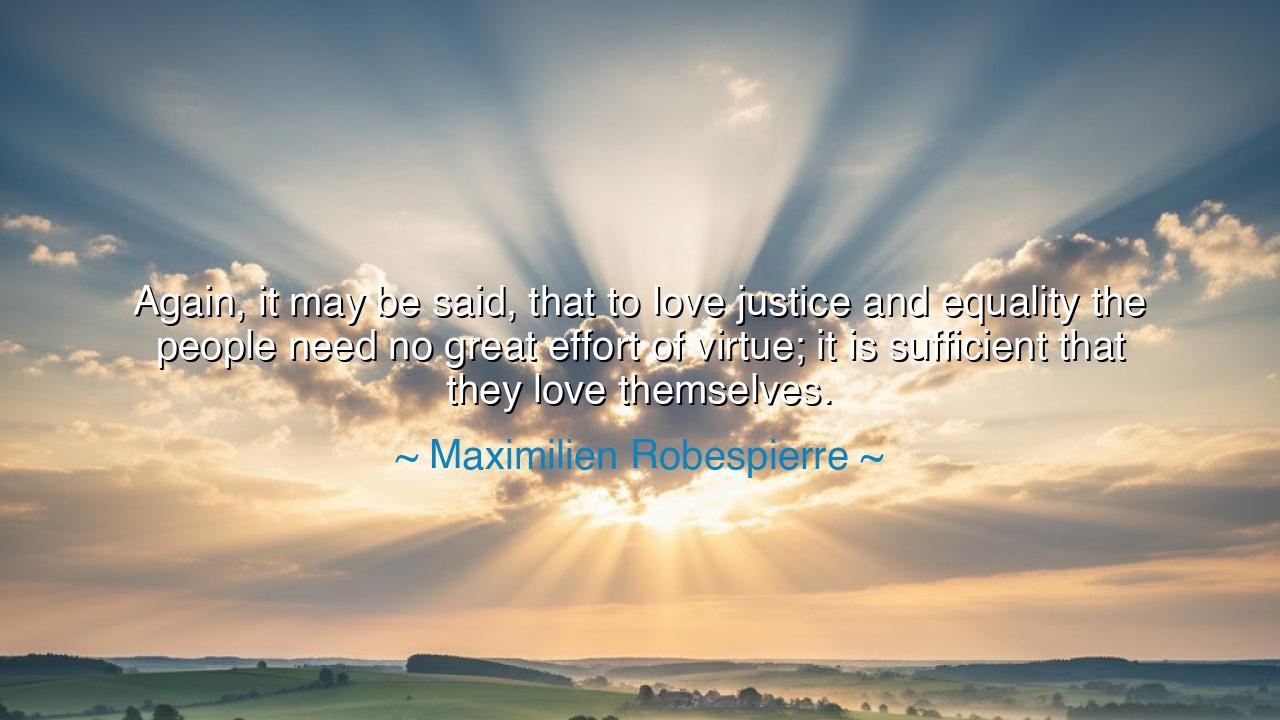
Again, it may be said, that to love justice and equality the
Again, it may be said, that to love justice and equality the people need no great effort of virtue; it is sufficient that they love themselves.






The words of Maximilien Robespierre—“Again, it may be said, that to love justice and equality the people need no great effort of virtue; it is sufficient that they love themselves”—speak as thunder rolling over the mountains of history. In these words is found not only a reflection on the spirit of revolution, but a profound insight into the nature of human virtue itself. Robespierre, the ardent voice of the French Revolution, saw that justice and equality are not lofty gifts bestowed by saints or rulers, but the natural birthright of every soul that knows its own worth. He declared that to seek justice, one does not need to be divine—only to recognize one’s own humanity, and therefore, the humanity of others.
When Robespierre uttered these words, France was in the throes of upheaval. The old order had crumbled; kings and nobles had lived fat upon the toil of the poor, while the people starved in the shadows of gilded halls. The Revolution’s cry—liberté, égalité, fraternité—was not born of abstract philosophy alone, but of the deep, instinctive yearning for dignity and fairness. Robespierre saw that when the people rose, they did not rise out of cold reason, but from a simple truth: that to love oneself is to refuse to be trampled upon, and to extend that same refusal to all who suffer. Thus, love of self, rightly understood, is the seed of justice.
Consider the ancient tale of Moses, who, though raised among Pharaoh’s luxuries, could not bear the sight of his brethren beaten beneath the lash. His awakening began not in divine revelation, but in compassion—the recognition that his own peace could not coexist with the suffering of others. From that love of justice, born out of identification with the oppressed, came liberation. So it was, too, in the streets of Paris, when the hungry and voiceless reclaimed their humanity. They did not require rare virtue, only the conviction that they were worthy of equality, as all humans are.
Robespierre’s insight carries a paradox both simple and profound. He tells us that self-love, often condemned as vanity, becomes the foundation of justice when purified by empathy. For when a person truly loves themselves—not with arrogance, but with respect—they cannot wish for another to be enslaved, degraded, or silenced. The one who honors his own soul cannot bear to see the soul of another demeaned. Thus, equality is not imposed from above; it rises naturally from hearts that understand their own value.
Yet, beware—there is a false self-love that corrupts. When pride replaces dignity, when greed masquerades as need, then love of self turns to tyranny and cruelty. Robespierre saw this danger too, for even among those who cried for liberty, ambition and vengeance soon followed. To love oneself rightly is not to place oneself above others, but to see oneself reflected in others. Justice and equality perish when self-love forgets that all souls share one flame.
The story of the Revolution teaches us that justice must begin within. The man who despises himself will oppress others to feel strong. The woman who believes herself unworthy will not demand her due. But when each person awakens to the sacred truth of their own value, the chains of oppression fall from every wrist. Nations built upon that understanding become sanctuaries of fairness; nations without it devour themselves in envy and power.
Thus, the lesson Robespierre left to future generations is this: love yourself not for pride, but for peace. Let that love remind you that your neighbor’s life is as precious as your own. When you see injustice, remember that the wound upon another’s back is also a wound upon your spirit. Defend equality not as an abstract ideal, but as a reflection of your own self-worth. For the moment you cease to care for others, you have ceased to care for the best part of yourself.
And so, my children, remember: to love justice and equality, you need not climb the mountain of saints nor dwell among philosophers. You need only to stand tall and say, “I am human, and therefore, all humans deserve the same sun.” In that moment, you become both the guardian of your own dignity and the keeper of the world’s. For to love oneself rightly is to love the whole of humankind.






AAdministratorAdministrator
Welcome, honored guests. Please leave a comment, we will respond soon